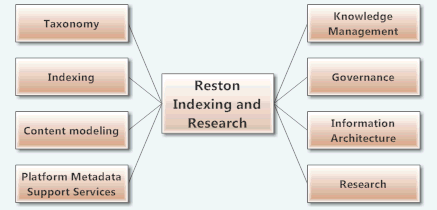

The goal of Reston Indexing and Research is to provide services essential to the discovery, organization, access, management, and presentation of knowledge. Activities include providing the following services:
Taxonomy
Taxonomy is the discipline of organizing objects into categorical structures or schema. Contemporary information technology and knowledge management strategies are dependent upon well-executed conceptual taxonomies. When developed as language standard for an enterprise, a taxonomy provides a model of the way it thinks about its business, and how well it understands customer needs. The scope of taxonomy activities range advanced concept modeling to defining the metadata elements and attributes associated with information components to user-friendly controlled vocabularies. Introduction to Taxonomy
Knowledge Management
Knowledge management is the discipline framing the strategic approaches need for information resource and data control that gives users the ability to discovery, access, and transform information into actionable knowledge and knowledge into organizational wisdom. Introduction to Knowledge Management
Indexing
Indexing is the association of categorical names with specific, meaningful instances of the named object to enable the retrieval highly relevant resources at a pragmatically determined level of detail or granularity. The scope of indexing range from the vocabulary standards for context-driven Search Engine Optimization (SEO) strategies to close analysis of texts along with the implementation of a locator system enabling the exact location of occurrences of specific information units. Introduction to Indexing
Governance
Governance is a change management strategy. The objective of this strategy is to optimize organizational maturity. Maturity is a standard for measuring growth. The concept of growth refers to the capacity to learn from, adapt to, and meaningfully use context circumstances beyond control. Governance is always a team process. The scope of governance services includes developing, facilitating, participating, and implementing team decisions effecting taxonomy and metadata services. Introduction to Governance
Content Modeling
Content modeling approaches knowledge-bearing objects with the goal of defining their organic structure. Defined organic structures of knowledge-bearing objects enable strategies that optimize replication, repurposing, and reuse of knowledge components. The scope of content modeling ranges focus on the formal descriptions of the structural components in terms component types and attributes.
Information Architecture
Information architecture is the presentational design plan for knowledge units intended to inform users. The goal of information architecture is to provide a clear frame for users to work efficiently with the content presented. This goal is achieved by reinterpreting the knowledge taxonomy to align it with the taxonomy of user requirements. The scope of information of information architecture ranges from participating in web site development to design styling of specialized publications.
Platform Metadata Support Services
Information platform metadata support services is the process of maintaining alignment between content and knowledge management systems and current business and user needs to perform both on-going work and to achieve maturity goals, and includes aiding system migrations and upgrade processes. Processes working with available best practices, standards organization driven change, and technology innovation present opportunities of use of taxonomy and metadata to serve knowledge needs. The scope of support services include review and augmentation of taxonomy and metadata, metadata mapping across systems, and business information flows and process documentation.
Research
Research is a strategic process designed to inform action plans and opinions. Implementation of this strategy involves that tasks of discovering information sources and repositories, mapping information and workflow, close review of information bearing units, tracing information-related dependencies, and extraction of content elements salient to frame and appropriately explicate an understanding of a topic. The scope of research ranges from organization and network service architectures to analyzing and mining pre-existing archival knowledge repositories.